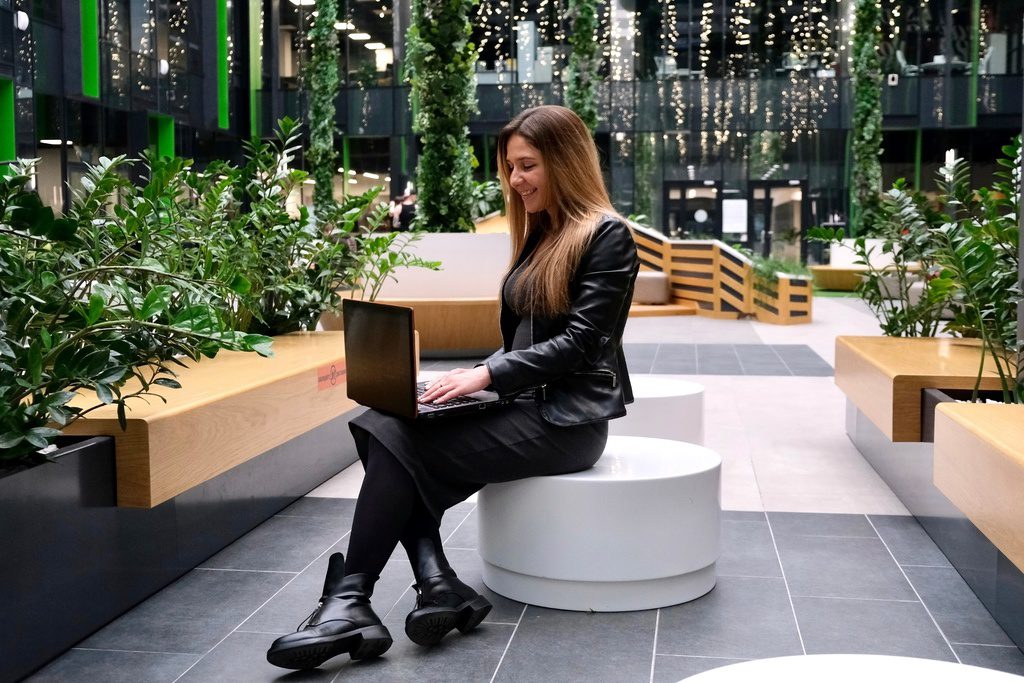Key Points
- Company culture refers to the shared values, beliefs, attitudes, and behaviors that define an organization.
- Company culture remains important in remote work environments—and may even be more important in order to overcome the challenges that remote workers face (such as limited face-to-face interaction, communication barriers, different work styles, lack of team cohesion, and unequal access to information).
- Companies with hybrid or remote workers can increase employee engagement and culture adoption by using integrated communication tools, providing remote-specific training and resources, scheduling regular check-ins, fostering virtual social connections, establishing clear goals and expectations, recognizing and rewarding achievements, and encouraging work-life balance.
- Creating a hybrid workspace with a human-centered design (i.e. one that uses technology to support the needs of people instead of the other way around) is also vital for creating the authentic connections that strong company culture depends on. ET Group can provide consulting and workshops to help your company culture thrive in a hybrid environment, and can also design a hybrid solution tailored to your business’ needs.
In the era of remote work, company culture remains just as important as ever before. In fact, we believe the relevance of company culture has increased due to the unique challenges posed by remote work.
The custom hybrid workplace solutions we create at ET Group are meant to combat the potential challenges hybrid and remote workers face, so we know all about how to use technology to enhance company culture, even—and perhaps especially—at a distance. Read on to learn about tips, tricks, and tools you can use to give your company culture a boost no matter where your people are working from.

Via Adobe Stock.
What Does Company Culture Mean in the Era of Remote Work?
Company culture refers to the shared values, beliefs, attitudes, and behaviors that define an organization. However, in remote work environments, it can be difficult to maintain a sense of community and shared purpose among employees who don’t always (or ever) physically work in the same location. This can lead to feelings of isolation, disconnection, and disengagement.
To address these challenges, your organization should focus on building a strong and inclusive culture that supports remote work instead of resisting it, since remote work has many benefits (and, let’s be honest, isn’t going anywhere soon). By doing so, you can create a sense of belonging and shared purpose among your remote and hybrid employees, leading to increased engagement, productivity, and job satisfaction.
Unique Challenges Faced by Hybrid & Remote Teams
The relevance of company culture in the era of remote work has not changed, but it has become more challenging to maintain. Challenges for hybrid and remote teams commonly include:
- Limited face-to-face interaction: Remote and hybrid environments with limited opportunities for face-to-face interaction make it difficult to build personal connections and develop a shared sense of purpose.
- Communication barriers: Communication barriers such as time zone differences, language barriers, and technological difficulties can make it challenging to maintain effective communication and collaboration within a team.
- Different work styles: Remote and hybrid teams often have different work styles and preferences, which can lead to differences in communication styles, work processes, and expectations.
- Lack of team cohesion: Without opportunities for high-value interactions, remote and hybrid teams may struggle to develop a sense of team cohesion and shared identity, which can lead to feelings of isolation and disengagement.
- Unequal access to information: Remote and hybrid teams may have unequal access to information and resources, which can lead to feelings of exclusion and a lack of trust.

Via Adobe Stock.
Tips for Increasing Employee Engagement & Culture Adoption
Companies that are able to adapt and create a strong culture in a remote work environment are better positioned to attract and retain top talent, drive innovation, and achieve their goals. Here are some ways to make sure your hybrid work environment supports and promotes your company culture:
- Use integrated communication channels: Multiple communication channels (like email, video conferencing, and chats) help keep employees engaged and informed, but they need to be able to work effectively together. Using communication tools that synchronize with each other helps make sure your team members are always on the same page.
- Provide remote-specific training and resources: Offer training and resources that specifically address the challenges of working remotely, such as time management, communication, and technology.
- Schedule regular check-ins: Schedule regular check-ins with remote and hybrid employees to provide feedback, offer support, and check in on progress.
- Foster virtual social connections: Encourage social connections between remote and hybrid employees through virtual team-building activities, social events, and online communities. One example of a virtual team-building exercise for remote or hybrid workers is a virtual scavenger hunt—team members are given a list of items to find or tasks to complete within a certain time frame, and they use video conferencing to collaborate and share their progress.
- Establish clear goals and expectations: clear policies for remote and hybrid employees keep everyone working efficiently towards the same objectives (one example of this could be choosing preferred methods of communication for specific tasks to prevent missed messages when collaborating on projects).
- Recognize and reward achievements: Acknowledge remote and hybrid employees for their achievements, such as hitting a milestone, completing a project, or going above and beyond.
- Encourage work-life balance: Encourage work-life balance by offering flexible work schedules, limiting after-hours communication, and promoting mental health and wellness. Human-centric hybrid spaces can make this easier by facilitating asynchronous work schedules.

Via Adobe Stock.
Frequently Asked Questions about Company Culture
What role do leaders play in shaping company culture in remote or hybrid work environments?
As a leader, you set the tone for your organization. You’re responsible for modeling the behavior you want and communicating your company’s values and expectations. It’s also up to you to make sure your employees have the tools and training they need to work together effectively—this could involve anything from upgrading your audiovisual equipment to completely redesigning your workspace to accommodate hybrid and remote employees.
How should I design a hybrid workspace to support my company culture?
Each workplace has unique needs, but one of the most important principles in creating an effective hybrid workspace is human-centered design. This design philosophy places the needs and experiences of people at the center of the design process, and views technology and infrastructure as resources intended to serve their needs.
In the context of hybrid work environments, human-centred design involves designing workspaces, policies, and technologies that meet the needs of remote and in-person workers. This approach will help you create a more inclusive and equitable workplace that supports employee well-being, productivity, and engagement.
How can I adapt my company culture to accommodate different work styles and preferences?
The more flexibility you provide, the more it will empower your hybrid and remote workers. Spaces and policies that allow for different work schedules are an important part of this process, as is providing training and resources to help your employees adapt to working remotely or in hybrid settings.
We also recommend adapting your work environment to accommodate new styles of working—like self-management, where the individual responsibilities of each team member are prioritized and shared commitments drive productivity instead of top-down mandates. Learn more about self-management here.
How can I make sure my remote and in-person employees are equally included and engaged in my company culture?
The key to this is to ensure that all employees, regardless of where they’re working from, have equal access to resources, information, and opportunities for connection. This may require you to invest in audiovisual technology that makes it easier for off-site employees to participate in meetings and team-building exercises.
How can I keep my company culture relevant as my business grows?
Monitoring your company culture helps ensure that it’s aligned with your business goals and the needs of your team members. Here are some ways to keep tabs on your company culture as your business develops:
- Conduct surveys
- Track retention rates
- Observe employee behavior
- Analyze employee productivity
- Monitor online reviews (on Glassdoor, LinkedIn, and other social media platforms)
- Carry out exit interviews
Keeping your company culture relevant in a hybrid or remote work environment may also require you to update the technology your team uses to stay connected. Consider engaging a technology consultant to identify the areas where your communications technology needs improvement.
Stay connected with us:
Follow ET Group on LinkedIn
Follow us on Twitter
Subscribe to ET Group’s YouTube Channel








